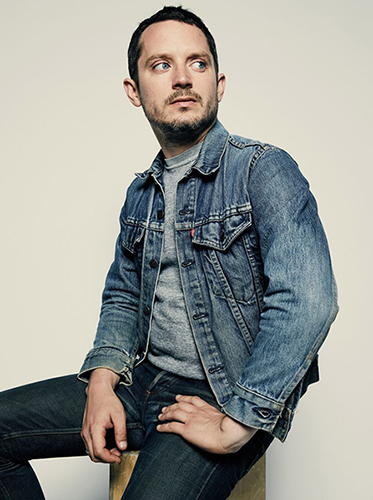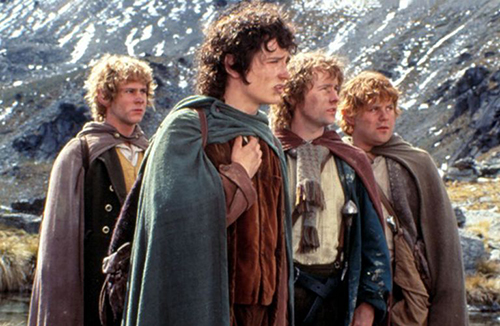Elijah Wood Will Be Frodo Forever
by, Matt Miller December 20, 2021 Esquire

The hobbits have a group text.
“Yes, we call ourselves the hobbits,” Elijah Wood confirms before I can even ask if Sean Astin, Billy Boyd, and Dominic Monaghan really refer to themselves as “the Hobbits.” It’s a title they’ve embraced for 20 years now, since they first appeared as Frodo Baggins, Samwise Gamgee, Pippin Took, and Merry Brandybuck, respectively, in Lord of the Rings: The Fellowship of the Ring.
The hobbits have remained friends but they’ve rarely had the chance to get all four of them together in one place. Until now, as the most beloved fantasy series ever made celebrates its 20th anniversary. The chat has been blowing up lately. This month, they traveled to New York City for an upcoming anniversary event, but their Ring Bearer couldn’t make it there in person, a fact that’s caused him not a little FOMO.
“They’ve been going out to dinner and they’ll text me a photo of my seat at the dinner table without me in it, which is really, really sweet,” Wood tells me over Zoom from his home in LA. “They’ve been texting each other in the morning, like ‘Let’s go get coffee.’ We haven’t really been able to hang out like this in 16 years probably.”
Together, they had been on a journey that began in 1999 and lasted through 438 days of filming (all three movies at once!) in New Zealand. From remote mountain tops, to the middle of orc armies, to grueling hours of make-up, and local pubs after 16-hour days of shooting, the hobbits formed a real fellowship during those 16 months filming in New Zealand (three months longer than it took Frodo and Sam to walk the ring to Mordor and make it back home to the Shire). “That will link us forever,” Wood says.
Wood was a spritely 18 years old when he touched down in New Zealand to begin filming Rings. And, looking back as a now-40-year-old, he’s amazed by how formative his years filming Rings actually were.
“That was my first time living away from home for any long period of time. So it was a giant leap for me in terms of growth and maturity and responsibility and life experience. Like, fuck,” Wood says looking back on it. “I had my own house there. This is coming from still living at home. I had my own car. I had a life that I built in New Zealand playing a role that was a huge responsibility.”
Wood credits his companionship with his castmates for helping him bear the stresses of adapting such a beloved series of books. They were all in it together, sharing the burden, and the pressure of getting it right. It also didn’t hurt that Twitter didn’t exist. “Thankfully, at the time, the Internet was in its infancy,” Wood says. “Theonering.net existed, there were eyes on us, but not even close to the degree of scrutiny that exists now.”

Without the lidless eye of the Internet, they had to trust in the team they were working with that they were adapting this the right way, or at least in a way that could appease millions of fans. Maybe this is partially why Wood has still never finished reading Lord of the Rings.
“The book is dense and verbose and incredible and literary and beautiful, but heavy,” Wood says. “I found it taxing to read the book with all the work in tandem I was doing on my character. I sort of pivoted my focus to just live in the world of the character as written in the scripts and trust the process.
“I still haven’t read it, 20 years later. It’s ridiculous that I haven’t. It is my cross to bear. It’s so dumb. Everybody else has read it,” he says, laughing. Thinking back on it 20 years later, Wood says it’s the small moments that have stuck with him the most.
“Meeting for brunch on weekends. The time in between setups—we’d have a couple hours where we’d take naps in each other’s trailers, or bring rented DVDs or VHS tapes from the local video store and watch them in one of our trailers,” Wood says. “It’s stuff like that I sort of treasure the most, because these movies are so massive and the scale of them is so extraordinary, and they really are the culmination of thousands of people’s work and artistry.” And then there was the time Astin impaled his foot.
They were filming the scene where Frodo parts ways with the Fellowship. Sam finds Frodo paddling away off to Mordor by himself, and starts wading into the river despite the fact that he can’t swim. This is actually the alternate version of the climactic scene. Originally, it was supposed to be Sam who saves Frodo, which they filmed first.
“The water was freezing. It was essentially a mountain runoff lake,” Wood remembers. “And so I was in the water for about 45 minutes. Apparently I turned a shade of blue. And it took about an hour and a half to get warm again.”
Then Jackson changed the ending so Frodo would save Sam instead—the version that is now in the movie. But, when they’re filming this scene, Astin stepped on a branch that was poking up in the water, which “punctured the bottom of his foot and left a massive gash,” Wood remembers.
“He pulled the branch out and there was this slit in his foot and a blob of coagulated blood came out,” Wood says. “It was so big and I was so fascinated with it that I grabbed a stick and he was being tended to and I was like, ‘Man, this is fucking crazy.’ And he’s like, meanwhile, being seen by a doctor and here I am fascinated by the blood, knowing that he was absolutely fine.”
Wood first saw the final cut of Fellowship of the Ring in late November 2001, only weeks before the release date. “It was totally overwhelming,” he says. “I didn’t know what to feel, to be totally honest with you. I knew I loved it, but I couldn’t process it. I remember all of us walking away kind of in a daze, sort of bowled over and overwhelmed and in love with it, but couldn’t make heads or tails until we saw it again. And I think that was just the enormity of it all and separating our personal experience from what it is, seeing it for what it is, an amazing experience. I certainly haven’t had that since.”
By the end of opening weekend, Fellowship had overwhelmed the box office too, with a total gross of $47,211,490. For the next two years, Wood’s life remained partly in Middle-earth during the promotion cycle and everything else required of him to wrap up the release of the second two films. When it all was over Wood needed to take stock of who he was.
“My life was so defined by being in New Zealand, by playing this role, by being with these people for so long,” Wood remembers. “It was a mixture of being so exhausted, beyond anything I’d ever experienced. I got pretty sick, actually, just from that exhaustion. My immune system was just like, ‘You’re going to lay down for a while.’ I just needed to get a sense of ‘Who am I, what am I, what am I doing?’”

Wood says it took him five or six weeks to figure out what he could do next. With Rings finished, Wood says he remembers thinking, “Well, I don’t know if there is a chance that I’ll be typecast in this. I just want to continue working on doing things that are so different.”
In just the first two years after Rings, Wood was already starting to define himself as the actor he’d be for the next two decades: a manipulative memory technician in Michel Gondry’s arthouse classic Eternal Sunshine of the Spotless Mind; a cannibalistic serial killer in Sin City; a fish-out-of-water journalist caught in the middle of London football rivalries in Green Street Hooligans; a young man connecting with his roots on a trek through the Ukraine in Everything Is Illuminated. “I just felt like if I just kept working on things that were really different, I could have a healthy separation from Lord of the Rings,” Wood says.
Long before he appeared in Rings, Wood had developed a love for genre films—particularly horror, (which perhaps explains his fascination with Astin’s bloody foot). As a kid, Wood’s older brother would rent horror movies and show them to him as long as he promised not to tell mom and dad. The movies didn’t scare him when he was little, although he says he did have a fear of getting kidnapped because of watching too much Unsolved Mysteries.
“Initially it’s the forbidden fruit, right? It’s the thing you’re not supposed to watch. You really want to see it. Then I just fell in love with it from an artistic standpoint,” he says. “Genre films and horror are one of the more exciting places for filmmakers to be, because it allows for such creative decisions that in some cases, a typical drama or otherwise may not afford you those licenses.”
This is where Wood has thrived in the decades since Rings—in thrillers, slashers, bloody comedies, psychological action films. He plays weirdos, creeps, killers, and normal guys thrown into situations of extreme violence, or normal guys losing their grip on sanity. You could see all of this when he was 18, bringing an incredible range of emotion to Frodo. He has an astonishing ability to show fear or paranoia or simmering evil along with innocence—it’s all in Those Eyes.
Beyond acting, Wood has explored genre films behind the scenes as well, with his production company SpectreVision, founded alongside directors Daniel Noah and Josh C. Waller in 2010. Their company is behind some of the most critically acclaimed genre films of the last decade, including Esquire’s best film of 2017 Mandy, A Girl Walks Home Alone at Night, Daniel Isn’t Real, and Color Out of Space.
Wood just wrapped filming the The Toxic Avenger, which is directed by Macon Blair, who he worked with in the cult-favorite indie thriller I Don’t Feel At Home in This World Anymore.
“A defining aspect of me coming into my own as an adult is just recognizing, distilling down what it is that I love. I love filmmaking, but I also just really love working with people that I admire,” Wood says. “Macon is an incredible writer. I love him as a filmmaker. To get a chance to be a part of that, to play a villain was really fun.” Despite his decades of work outside of Rings, Wood says he will always be proud to be known best as Frodo.
“These characters that we played will be with us forever,” Wood says. “And in many ways, they will probably be the first thing that people think about when they think about us, which I never really had an issue with.”
Throughout the last two decades, Rings has managed to maintain a persistent presence in popular culture. Where there’s a phenomena of backlash to both Oscar Best Picture winners and massive blockbusters, Rings still feels immune to the hater culture of the Internet. Part of that is because the film still absolutely holds up visually.
“It doesn’t feel like it’s been dated. But I also think that there’s a lot of heart in those films,” Wood says. “I think that’s Tolkien. It’s the great power of those stories. There’s sort of something in it for everybody. At the core of it, it’s the story about literally the smallest person in the world being capable of changing, of affecting real change, and I think that message is universal. Everybody can relate to that on some level.”
Also, the memes are really good.
Wood himself doesn’t follow the Internet’s endearing obsession with LOTR memes, but he did learn about the “All Right Then, Keep Your Secrets” meme when strangers started quoting it to him on the streets. “I’d completely forgotten that line. Then people started asking me to say it, and it was because it had become a meme. I had no idea. But it shows how this is weirdly enduring.”
And endure Lord of the Rings will—certainly for the next two 20th anniversaries for the final two movies, which may mean the hobbit group text will remain active.